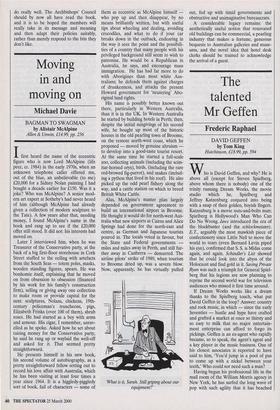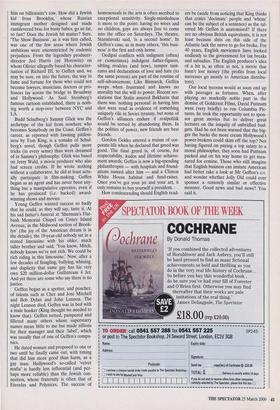The talented Mr Geffen
Frederic Raphael
DAVID GEFFEN by Tom King Hutchinson, £18.99, pp. 594 Who is David Geffen, and why? He is above all (except for Steven Spielberg, above whom there is nobody) one of the trinity running Dream Works, the movie studio which he, Spielberg and Jeffrey Katzenburg conjured into being with a snap of their golden, boyish fingers. Katzenburg is a movie nuts-and-bolts man; Spielberg is Hollywood's Man Who Can Do No Wrong. Jaws introduced the era of the blockbuster (and the schlocicmeister). E.7'., arguably the most mawkish piece of confectionery since Little Nell to move the world to tears (even Bernard Levin piped his eye), confirmed that S. S. is Midas come again, and again. Schindler's List showed that he could look into the abyss of the Holocaust and find gold in it. Saving Private Ryan was such a triumph for General Spiel- berg that his legions are now planning to reprise the second world war for television audiences who missed it first time around.
If Dream Works works like a dream thanks to the Spielberg touch, what put David Geffen in the loop? Answer: country and rock music, in which — since the early Seventies — hustle and hype have crafted and grafted a market at once so thirsty and so easy to milk that no major entertain- ment enterprise can afford to forgo its pickings. Geffen is an ex-agent who rapidly became, so to speak, the agent's agent and a key player in the music business. One of his closest associates is reported to have said to him, 'You'd jump in a pool of pus to come up with a nickel between your teeth.' Who could not need such a man?
Having begun his professional life in the mail room of the William Morris agency in New York, he has surfed the long wave of pop with such agility that it has beached him on billionaire's row. How did a Jewish kid from Brooklyn, whose Russian immigrant mother designed and made cantilevered bras for busty babes, go so far, so fast? Does the Jewish bit matter? Sure. 'The Show Business', as it was first called, was one of the few areas where Jewish ambitions were unconstricted by endemic prejudices. From the legendary producer- director Jed Harris (ne Horowitz) on whom Olivier allegedly based his character- isation of Richard III, to Geffen and, we may be sure, on into the future, the way to fame and fortune for those who could not become lawyers, musicians, doctors or pro- fessors lay across the bridge to Broadway and Hollywood. As Saul Steinberg's famous cartoon established, there is noth- ing worth a stop-over between NYC and LA.
Budd Schulberg's Sammy Glick was the archetype of the kid from nowhere who becomes Somebody on the Coast. Geffen's career, as reported with fawning pitiless- ness by Tom King, is a remake of Schul- berg's novel, though Geffen pulls more tricks (in every sense) than were dreamed of in Sammy's philosophy. Glick was based on Jerry Wald, a movie producer who also had screen credits. If he wrote nothing without a collaborator, he did at least actu- ally participate in film-making. Geffen began as an agent and has never been any- thing but a manipulative operator, even if he has produced (i.e. backed) award- winning shows and movies. Young Geffen wanted success so badly that he could, as they will say, taste it. At his sad father's funeral at 'Sherman's Flat- bush Memorial Chapel on Coney Island Avenue, in the Midwood section of Brook- lyn' (the joy of the American dream is in the details), the 18-year-old nobody sat in a rented limousine with his older, much taller brother and said, 'You know, Mitch, nobody knows we're not rich. We could be rich riding in this limousine.' Now, after a few decades of finagling, bullying, whining, and duplicity that same guy has his very own $20 million-dollar Gulfstream 4 Jet. And yet there are some who say there is no justice. Geffen began as a spotter, and poacher, of talents such as Cher and Joni Mitchell and Bob Dylan and John Lennon. The night Lennon died, Geffen was in bed with a male hooker (King thought we needed to know that). Geffen netted, pampered and filleted many others whose superstarry names mean little to me but made zillions for their manager and their 'label', which was usually that of one of Geffen's compa- nies.
He dated women and proposed to one or two until he finally came out, with timing that did him more good than harm, as a gay man. Hollywood's so-called 'velvet mafia' is hardly less influential (and per- haps more reliable) than the Jewish con- nection, whose fraternity is often that of Eteocles and Polynices. The success of homosexuals in the arts is often ascribed to exceptional sensitivity. Single-mindedness is more to the point: having no wives and no children, gays are always free to come into the office on Saturdays. The theatre, Stanislavaki said, 'is a second home'. In Geffen's case, as in many others, 'this busi- ness' is the first and only home.
Oedipal conflicts with indignant (often) or (sometimes) indulgent father-figures, sibling rivalries (and how), temper tant- rums and declarations of love and hate (to the same person) are part of the routine of self-advancement. Like Bismarck, Geffen weeps when frustrated and knows no morality but the will to power. Recent rev- elations that Stalin assured Bukharin that there was 'nothing personal' in having him shot were read as evidence of something uniquely vile in Soviet tyranny, but none of Geffen's alliances endure if realpolitik would be served by abandoning them. In the politics of power, new friends are best friends.
Gordon Gekko uttered a truism of cor- porate life when he declared that greed was good. The final greed is, of course, for respectability, kudos and lifetime achieve- ment awards; Geffen is now a big-spending philanthropist — with hospitals and found- ations named after him — and a Clinton White House habitué and fund-raiser. Once you've got your jet and your art, it only remains to buy yourself a president. How condescending should English read- ers be (aside from noticing that King thinks that critics 'decimate' people and 'whom' can be the subject of a sentence) as the tal- ented Mr Geffen is anatomised? If there are no obvious British equivalents, it is not least because shits on this side of the Atlantic lack the nerve to go for broke. For 40 years, English moviemen have looked endlessly to the government for tax breaks and subsidies. The English producer's idea of a hit is, as often as not, a movie that hasn't lost money (the profits from local successes go mostly to American distribu- tors).
Our local tycoons would as soon end up with peerages as fortunes. When, after playing no markedly noble part in the demise of Goldcrest Films, David Puttnam went (very briefly) to run Columbia Pic- tures, he took the opportunity not to spon- sor great movies but to deliver great lectures on the iniquity of unbridled bud- gets. Had he not been warned that the big- ger the bucks the more cream Hollywood's power-brokers could skim off the top? Not having figured on paying a top salary to a moral philosopher, they soon had Puttnam packed and on his way home to get mea- sured for ermine. Those who still imagine that English business can imitate American had better take a look at Mr Geffen's c.v. and wonder whether Jolly Old could ever sponsor a remotely similar or effective monster. Good news and bad news? You said it.



































































 Previous page
Previous page